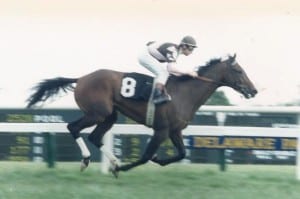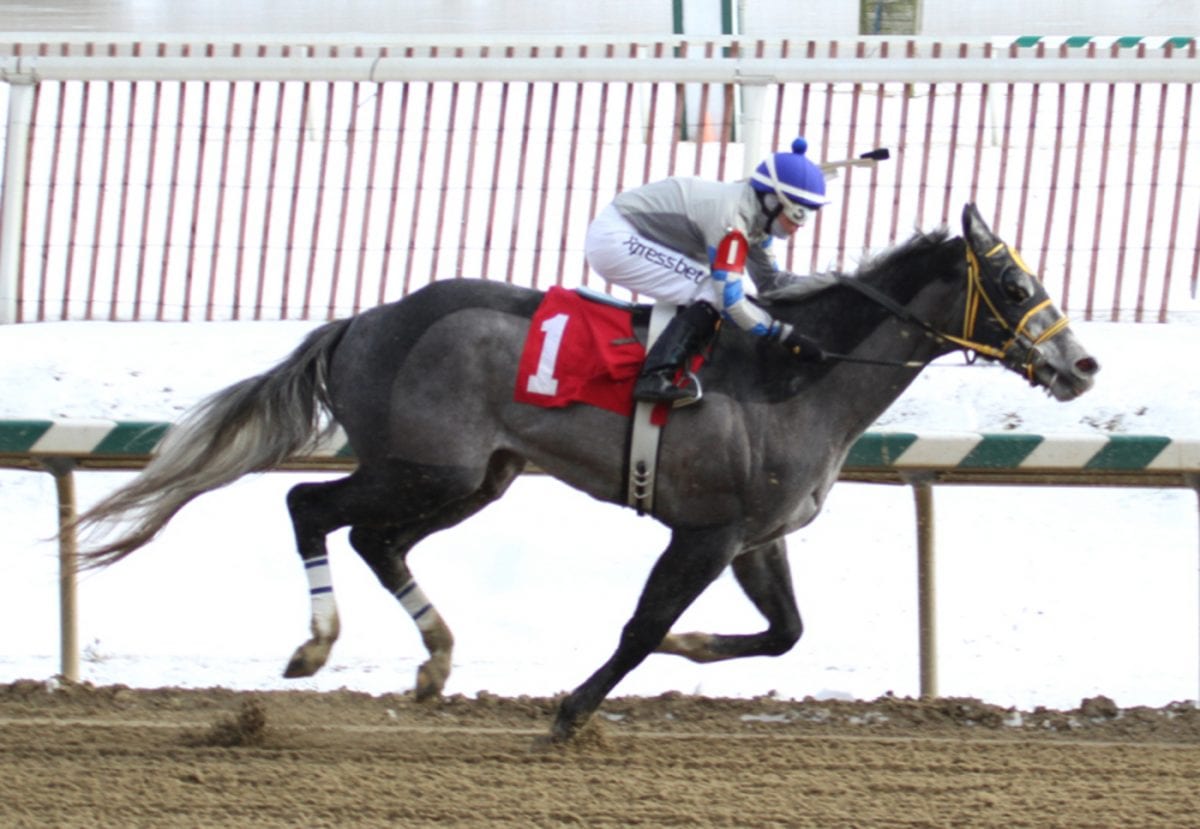by George Rowand
Claiming races often are looked at as the bottom of the barrel, the end of the line or the point of no return. Yet isn’t there another way to view – and participate in – claiming races?
Our experience in racing says, “Yes.”
When we started racing horses that we had bred, we had no illusions. We owned cheap horses.
We had paid stud fees in the $2,500 to $6,500 range, and the three dams of our horses collectively had never won a single race. We had been in the business for seven years, and in that time, we had won one race, a $10,000 maiden claimer by a horse that had cost us $25,000 as a yearling. So any dreams of racing glory had been effectively eliminated by the brutal reality that racing deals out.
We sent the first horse we bred and kept – Highland Springs, a gelding by a $3,500 stallion and out of a mare that won $450 in her racing career – to the races in July of his 3-year-old year. What I was saying at the time was, “All I want him to be is a $25,000 claimer. Is that too much to ask? You know, one that can win races and pay his way and give us some fun.”
When it was time to enter him for the first time, trainer Barclay Tagg called to say, “I think he’s worth about $18,500.” I was gleeful. I called my sister with the news, and then called Barclay back to say that he had my permission to race him for $14,500 the first time out — to make it easier for him. He did. And our horse ran seventh and never threatened at any time.
I told Barclay to drop him to the $6,500 maiden claiming level for his next start. He won easily, and jockey Kent Desormeaux came to the winner’s circle a lot more excited than he should have been for a win at that level.
“You know how many runs he gave me? Three!” Kent said. It seemed like a good thing.
His next time out, we shipped him to Delaware for a race on the grass in a starter handicap, and he won easily. Back at Pimlico, he ran in another starter handicap, and when they turned for home, the announcer called out, “It’s Blue And Bold on the lead, but up on the outside, it’s Highland Springs!” You could have knocked me over with a feather. He had won three in a row.
Next out, he won a $25,000 claimer, and then, at the end of the year, he won an allowance race. It was like a dream come true. We owned an allowance horse.
Highland Springs went on and on, eventually winning three graded-stakes races, banking over $400,000 in earnings, setting a track record at Saratoga and running in the Breeders’ Cup Mile.
Now the question is: was he destined to do all that, no matter where he began his career?
I can answer quickly: no way.

Highland Springs won 13 races, three graded, and more than $400,000 — after breaking his maiden for $6,500. Photo courtesy of George Rowand.
There is no way that Highland Springs – at the start of his career – could have beaten the kind of horses that he beat later in his career. In my mind, he needed to become a professional racehorse, and my job – as I saw it – was to make it as easy as I could for him. He needed to get his confidence level up, and there is no better place to do that than in claiming races.
Here’s another example. Miss Josh started her career in a $50,000 maiden claimer. She was trounced on a sloppy track. We dropped her to $25,000. She lost. To $18,000. She lost. And finally to $12,000, where she won, and then started up the racing ladder, eventually becoming a grade 1 winner and Eclipse Award finalist while banking $758,000 in earnings.
Early in her career, could she have beaten the kind of horses that she beat later? Clearly, she couldn’t, but she was another one who benefited from getting to run against and beat easier competition early on, when, I believe, it is most important.
Here’s another example, from the opposite side, with a horse that we bred and sold, for $6,700. He made his first start in a maiden special weight race at Saratoga, running 12th and last. Among his rivals that day, the horse that ran 11th eventually became a grade 1 winner of $1.4 million. Think the modestly bred horse we sold might have benefited from an easier first start? I know I do.
Given that someone could have claimed two multiple graded stakes winners from us for a total of $18,500, people always ask, “Weren’t you afraid someone would claim your horses?”
No.
For one thing, they were out of a mare that was a failed racehorse and by cheap stallions; they were pretty safe. And besides, I had confidence in our trainer. If Barclay couldn’t get them to win unless they ran in claiming races, who else could do better? In my opinion, nobody.
We did lose one horse near the start of his racing career. He was fourth first out, and then we dropped him in for $12,000 maiden claimer, which he won easily. We stepped him up to $18,500 the next time out, and after a ding-dong battle through the stretch, he won by a nose … and was claimed. I was sorry about that, but he was exactly where he should have been to be competitive. He didn’t win the race by 10 lengths, he won by a nose. Looking back, he definitely was going in the right direction, and maybe he would have become a nice allowance runner for us or even a small stakes horse.
But I’d rather take the chance of losing a horse like that now and then if spotting them that way gives us the chance to develop graded-stakes winners like Miss Josh and Highland Springs.
[pullquote]But I’d rather take the chance of losing a horse like that now and then if spotting them that way gives us the chance to develop graded-stakes winners.”[/pullquote]After running horses that we bought as yearlings and watching them get beaten constantly, I had learned my lesson. My aim was to run horses where they could win, and win early, and especially, to win in an easy race. I wanted them to have a very positive experience in their first start. Moreover, I read some statistics that said that the vast majority of stakes winners break their maiden within their first four starts — and that’s exactly what happened with our four stakes winners.
Will all horses that get off to a good start in their careers end up as stakes horses? Of course not. But I suspect that they will have longer, more productive racing careers, that they will win more races and more money and that the owners will have a much better time in the racing business. I know we did. By always focusing on running our horses where I thought they should be competitive, we won 33 percent of our starts over the course of a decade. One summer, we ran our horses seven times. We won six races, and were second in a stakes.
Initially, Barclay Tagg said that he resented my “interference” in mapping our horses’ careers, but he came around.
“You were so good with spotting them that all I had to do was focus on training them,” he admitted. “It made it easier for me, actually.”
(Featured image, of Joint Custody, another stake winner who debuted in claiming company, by Laurie Asseo.)








